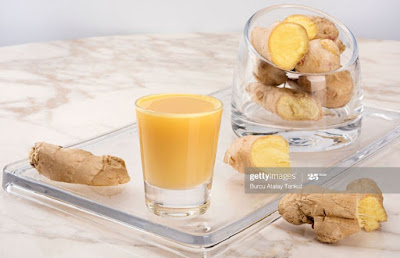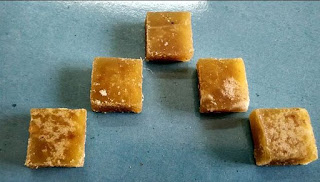Ginger is one of the World’s most renowned plants, have been used for several years as a spice to savour food and for its medicinal properties. The spice Ginger is a Rhizome that is a horizontal stem from which the roots emerge as a Ginger plant. Rhizome is the main section of the Ginger plant, which is an edible part of the plant. The root has essential oils and resins which is responsible for its odour and spicy savour. Ginger is aromatic, pungent and has hot taste.
BENEFITS
Ginger used thousands of years for handling several ailments from mild colds to extreme disease like cancer. Ginger has anti-oxidant, anti-inflammatory, anti-nausea, and anti-cancer properties. Ayurvedic texts accredited ginger as a “universal great medicine”.
Zingerone, shogaols, gingerols, and volatile oils give ginger its unique smell and savour, as well as its medical properties. These components in Ginger get vary depending on its geography, harvesting period and processing methods.
Gingerol
is the main bioactive component in Ginger; this is the medicinal part of the plant.
It has powerful anti-inflammatory and anti-oxidant effects. Further, Gingerol
has analgesic or painkiller, sedative, anti-pyretic and anti-bacterial effects.
Zingerone has an anti-oxidant property.”
MEDICINAL USES
 |
| GINGER JUICE |
Nausea : Ginger is a best home remedy which effectively works against nausea. Ginger usually used for several types of nausea and vomiting. Ginger is most effective remedy for morning sickness during pregnancy.
Chewing raw ginger or drinking ginger lemon tea is the best-proven home remedy for nausea. Consistent use of Ginger also helps to relieve from nausea due to vertigo, nausea after surgery, and vomiting in cancer patients who undergoes chemotherapy.
Digestion : Ginger is a digestive tonic, which improves gastric motility, alleviates constipation, vomiting, acidity. ‘The Complete Book of Ayurvedic Home Remedies’ written by Dr. Vasant Lad, says,
“The first key to prevention of indigestion is to enhance the digestive fire. One of the best herbs to kindle Agni is ginger. Before each meal, chop or grate a little fresh ginger, add a few drops of lime juice and a pinch of salt, and chew it up.”
Ginger helps in the movement of food flow through the gastrointestinal tract. It also induces the taste buds. It helps in faster digestion. The enzyme Zingibain assist in protein digestion.
Ginger help in decreasing belching and flatulence. Ginger reduces the pressure on the openings between the esophagus and stomach. As an antibacterial, ginger fights against the harmful bacteria in the human stomach without killing beneficial bacteria.
Cough and Cold : According to Ayurveda one of the best remedy for cold is ginger. Fresh Ginger juice is a best choice for cold.
Generally, Ginger is warm or heat in nature. So if consumed it promotes sweating. This help in ailments of symptoms of cold and get rid of infections.
Fresh Ginger is effective against the respiratory syncytial virus (HRSV). This is due to the presence of Gingerol and Shogaol compounds. These compounds lowers fever reduces pain and suppress the cough.
Inflammation : The bio active components in Ginger has anti-inflammatory and analgesic properties. It helps in relieving pain due to inflammation in Osteoarthritis, Rheumatoid arthritis and gout.
Osteoarthritis, Rheumatoid arthritis – is a degradation of the joints in the body or joint damage due to lack of calcium or Vitamin D. Consuming raw or cooked ginger as a regular diet can reduce pain with osteoarthritis. Ginger oil or Ginger gel applying or adding in the bathwater helps to relieve osteoarthritis pain or joint and muscle pain.
Dysmenorrhea : or Menstrual pain. One of the traditional uses of Ginger is relieving pain, which includes menstrual pain as well. Consuming Ginger powder or Ginger tea prior to the beginning of menstrual period or at the beginning of pain eases the pain caused by menstrual cramping. Ginger help to reduce the pain as effectively as drug ibuprofen and mefenamic acid.
Regulates Cholesterol : Ginger keeps the Heart (happy) to function properly. Ginger reduces the level of LDL (Low Density Lipoproteins) or ‘bad cholesterol’. Ginger helps in maintaining blood sugar level and lowers blood pressure. This makes the heart to function properly i.e. reducing the risk of heart disease. Regular consumptions of Ginger or Ginger powder keeps the heart healthy.
Cancer : The bio active constituent Gingerol, present in raw Ginger has an anti-cancer property. Growth of tumour related with inflammation and oxidative stress. Ginger has both anti-inflammation and anti-oxidative agents, which ails in prevention of cancer i.e. it prevents cancer cell growth. It also helps in the prevention and treatment of gastrointestinal cancers.
Migraines : Ginger helps in reducing migraine headaches. Ginger powder or raw or fresh ginger could stop and prevent migraine headaches.
Respiratory Relief : Ginger has been used for centuries in treating respiratory illnesses. Ginger facilitates relieve of inflammation related with asthma. Ginger helps in treating allergic diseases.
Fights infections : Gingerol, the bioactive constituent in fresh ginger, lowers the risk of infections. Ginger extract inhibit the growth of various types of bacteria, notably oral bacteria related to inflammatory diseases in the gums, such as gingivitis and periodontitis.
Alzheimer’s disease: The antioxidants present in ginger can help to prevent inflammatory responses, which occur in the brain. However, there is some proof that proves ginger can enhance brain function effectively.
CULINARY USES
Ginger Tea : Ginger is added while preparing tea in order to give a spicy flavour in India.
 |
| GINGER TEA |
Image Source : Wikimedia Commons
Ginger Lemon Tea : This tea is prepared by adding some fresh Ginger, lemon juice and honey in boiling water. It cures sore throat, aches and any pains.
Ginger Pickle : Fresh Ginger is sliced and added with salt and lemon. For extra spicy, add some finely chopped green chillies.
Ginger Ale : Grated Ginger is mixed with sugar and water. The mixer boiled until syrup and strain forms. Then a cup of lemon juice and 1 litre of regular soda added. Since it is high of sugar content, it is not advisable for pregnant women.
 |
| GINGER ALE |
Ginger Juice : Ginger is added to any juice while preparing. It gives delicious taste to juices, especially sugarcane juice.
REGIONAL CULINARY USES
Ginger used throughout the world, particularly in Asian countries like India, China, Korea and Southeast Asia. In Asia, Ginger consumed in fresh or in preserved form. Ginger used in numerous forms, including fresh, dried, pickled, preserved, crystallized, candied, and powdered or ground.
Many Asians especially Indians and Chinese grates the Ginger and made into paste, and applied on the meat, poultry, fish and vegetable dishes to avoid odour and it helps in removal of toxins from meat dishes.
In Southeast Asia Ginger used as raw or grated for savouring and for preserving meat. The Chinese use Fresh pickled and preserved Ginger to add spicy, savour in rice porridges, soups, fried meats and vegetables.
In India and Srilanka, dried and fresh Gingers used frequently. Dried Ginger is part of making curry, fried rice items along with garlic, onions and other spicy items to add flavour and aroma. In Indian cuisine, ginger is a main ingredient, especially in thicker gravies, as well as in many other food preparations, both vegetarian and meat-based.
Spiced
‘masala chai’ is a traditional Indian drink, which includes Ginger. Fresh or
dried, ginger used in spice tea and coffee. In south India, ginger used in the preparation
of a candy called ‘Inji-murappa’ ("ginger candy" from Tamil).
 |
| GINGER CANDY - INJI-MURAPPA |
In Japan, ginger is pickled to make ‘beni shoga’ and ‘gari’ grated and used raw on ’noodles’. Ginger made into a candy called shoga no ‘sato zuke’
In Burma, ginger called as ‘gyin’. Ginger used in cooking and in traditional medicines. Ginger consumed as a ‘salad’dish known as ‘gyin-thot’, in which the ginger is finely chopped and preserved in oil, with a variety of nuts and seeds.
Thailand, Malaysia, Vietnam, Indonesia and Philippines countries also uses Ginger in their dishes.
In Western Countries, Ginger is traditionally used in sweet dishes like ‘ginger ale’, ‘ginger bread’, ‘ginger snaps’, ‘parkin’ and ‘speculaas’. In France Ginger, flavoured liqueur called ‘Canton’ produced. ‘Ginger wine’ produced in United Kingdom. Ginger also used in preparing tea and coffee.
PRECAUTIONS
- As Ginger is herbal and used in various ailments, excessive supplements and intake of capsule is dangerous and leads to serious issues.
- If ginger juice consumed on an empty stomach, it induces acid and leads to heartburn. Therefore, the juice consumed with other foodstuffs.
- Ginger lowers blood sugar level so women with gestational diabetes should be cautious in use of Ginger.
- Ginger is hot or warm in nature; if bleeding occurs during pregnancy, consumption of Ginger stopped immediately.
- Herbalist recommends taking less than 4 grams of Ginger per day is good for health.
- Side effects include gas, heartburn and nausea.
- Avoid Consuming of Ginger after surgery.
CONCLUSION :
Ginger is a most loveable herb, which used in cooking, baking, and beverages around the world. It has a reputation for soothing an upset stomach and helps in the digestion process. It has many health related benefits and it used as one of the best home remedy for various ailments if consumed in right proportions.



No comments: